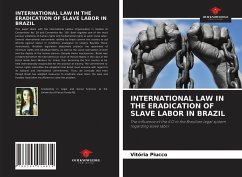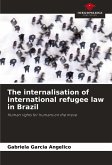This paper deals with the International Labour Organisation in relation to Conventions No. 29 and Convention No. 105. Both regulate one of the most serious violations of human rights and fundamental rights at work: slave labor. Several international instruments ratified by Brazil commit the country to act directly against labour in conditions analogous to slavery. Besides these instruments, Brazilian legislation objectively protects the guarantee of minimum rights and individual liberty, as well as the social valorization of work and the dignity of the human person. Despite these mechanisms, Brazil was condemned before the Inter-American Court of Human Rights in the case of the Brasil Verde Farm Workers Vs. Brazil, thus becoming the first country to be held internationally responsible for the practice of slavery. The commitment to human rights intensifies the obligation that Brazil must assume with regard to its national and international commitments. Thus, we conclude that even though Brazil has adopted measures to eradicate slave labor, the laws and treaties have been insufficient to solve the problem.
Bitte wählen Sie Ihr Anliegen aus.
Rechnungen
Retourenschein anfordern
Bestellstatus
Storno








